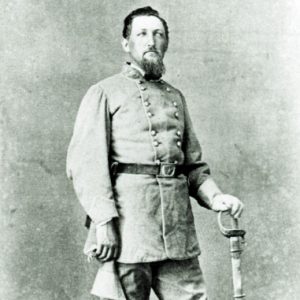calsfoundation@cals.org
Thomas Pleasant Dockery (1833–1898)
Thomas Pleasant Dockery attained the rank of brigadier general in the Confederate army, commanding Arkansas troops in a number of important engagements on both sides of the Mississippi River. He enjoyed a reputation as a gallant and aggressive commander. One private under Dockery’s command recalled, “It was one of Colonel Dockery’s hobbies to volunteer to take some battery or storm some difficult stronghold.” At his death, the Arkansas Gazette observed that Dockery “was a broad-gauged man. He was as brave and gallant a soldier as the Confederacy produced.”
Born in North Carolina on December 18, 1833, to Colonel John Dockery and his wife, Ann, Thomas Dockery eventually moved to Arkansas, settling in Columbia County, where his father established a large plantation. His father served as the first president and promoter of the Mississippi, Ouachita, and Red River Railroad; the Arkansas Gazette remarked that Dockery inherited his father’s “energy and go-aheaditiveness.”
At the onset of the Civil War, Dockery assumed command of the Fifth Infantry Regiment, Arkansas State Troops; he led this regiment at Wilson’s Creek, August 10, 1861. Some time after that regiment mustered out, Dockery became colonel of the Nineteenth Arkansas Infantry Regiment. This unit fought under Dockery’s command at Corinth (October 3–4, 1862), Champion Hill (May 16, 1863), and Big Black River Bridge (May 17, 1863). After participating in the defense of Vicksburg, Mississippi, Dockery and his men were captured with the surrender of the garrison on July 4, 1863. Dockery was later paroled—that is, released on his promise not to take up arms again until exchanged (which occurred on October 16, 1863).
Commissioned brigadier general on August 10, 1863, Dockery returned to Arkansas and assumed command of a brigade composed in part of other Vicksburg parolees. This brigade contested the Federal Camden Expedition in 1864. Dockery commanded Confederate troops in the Action at Mount Elba (March 30, 1864). Dockery and his troops attacked the numerically superior Federal rear guard in the Action at Moscow (April 13, 1864), and participated in the taking of a Federal wagon train in the Action at Marks’ Mills (April 25, 1864); elements of his brigade also fought in the Engagement at Jenkins’ Ferry (April 30, 1864). He played an important role in negotiating the surrender of Confederate forces in Arkansas in the spring of 1865.
Having lost his property in the war, Dockery turned to civil engineering and promoted railroad construction to rebuild his fortune; he secured lands and subscriptions totaling $2 million for the construction of a proposed line from St. Louis to the Gulf of Mexico by way of Little Rock (Pulaski County) and Shreveport, Louisiana. Dockery unsuccessfully sought the Democratic nomination for secretary of state of Arkansas in 1874 and participated in the Brooks-Baxter War that same year. Thereafter, economic conditions forced him to abandon his railroad project, and he moved to New York City. According to the Arkansas Gazette, “[t]here for several years he was a successful operator, but finally lost all his property and died in poverty” on February 27, 1898. One of his two surviving daughters, a resident of Natchez, Mississippi, arranged for her father’s burial in that town.
For additional information:
“Gen. Tom P. Dockery.” Arkansas Gazette. March 9, 1898, p. 4.
Harrell, John. Arkansas. Vol. 14, Confederate Military History, edited by Clement A. Evans. Wilmington, NC: Broadfoot Publishing Company, 1988.
Sifakis, Stewart. Compendium of the Confederate Armies: Florida and Arkansas. New York: Facts on File, 1992.
Warner, Ezra J. Generals in Gray. Baton Rouge: Louisiana State University Press, 1959.
Frank Arey
Morrilton, Arkansas
 Dockery Portrait
Dockery Portrait  Thomas Dockery
Thomas Dockery 



Comments
No comments on this entry yet.